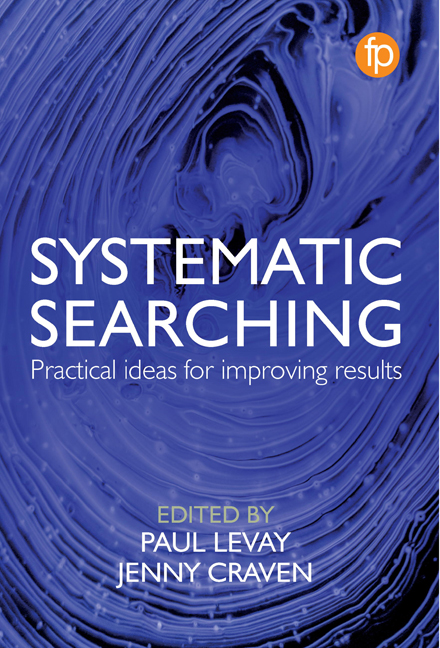Book contents
- Frontmatter
- Contents
- Figures, tables and case studies
- Contributors
- Acknowledgements
- Abbreviations
- Foreword
- 1 Introduction: where are we now?
- 2 Innovative approaches to systematic reviewing
- 3 Searching for broad-based topics
- 4 Choosing the right databases and search techniques
- 5 Gathering evidence from grey literature and unpublished data
- 6 Social media as a source of evidence
- 7 Text mining for information specialists
- 8 Using linked data for evidence synthesis
- 9 Evidence surveillance to keep up to date with new research
- 10 Training the next generation of information specialists
- 11 Collaborative working to improve searching
- 12 Communication for information specialists
- 13 The information specialist as an expert searcher
- 14 Conclusion: where do we go from here?
- Glossary
- Index
5 - Gathering evidence from grey literature and unpublished data
Published online by Cambridge University Press: 08 June 2019
- Frontmatter
- Contents
- Figures, tables and case studies
- Contributors
- Acknowledgements
- Abbreviations
- Foreword
- 1 Introduction: where are we now?
- 2 Innovative approaches to systematic reviewing
- 3 Searching for broad-based topics
- 4 Choosing the right databases and search techniques
- 5 Gathering evidence from grey literature and unpublished data
- 6 Social media as a source of evidence
- 7 Text mining for information specialists
- 8 Using linked data for evidence synthesis
- 9 Evidence surveillance to keep up to date with new research
- 10 Training the next generation of information specialists
- 11 Collaborative working to improve searching
- 12 Communication for information specialists
- 13 The information specialist as an expert searcher
- 14 Conclusion: where do we go from here?
- Glossary
- Index
Summary
Introduction
The objectives of this chapter are to describe sources of unpublished data and grey literature, review the challenges associated with finding and using these sources, and highlight the current tools and strategies to efficiently use them to strengthen systematic reviews and other information retrieval tasks.
Grey literature is defined by the Cochrane Handbook for Systematic Reviews of Interventions as ‘… literature that is not formally published in sources such as books or journal articles’ (Lefebvre, Manheimer and Glanville, 2011, 6.2.1.8). Another source provides a more qualitative description of grey literature as various document types that are ‘protected by intellectual property rights, of sufficient quality to be collected and preserved by library holdings or institutional repositories, but not controlled by commercial publishers’ (Schopfel, 2011, 5). Grey literature may be in print or electronic format and sources include gov - ernment reports, technical reports, theses and conference proceedings, among others.
We have chosen to adapt the definition for ‘unpublished sources’ as used by Su Golder and her colleagues in a study comparing the reporting of adverse events in published and unpublished sources (Golder et al., 2016a). Published papers typically are disseminated by peer-reviewed journals, whereas unpublished data is maintained by regulatory agencies, stored in trial registries or owned by industry (for example, pharmaceutical companies) or individual researchers.
Background
Scientific literature is critical to the documentation and dissemination of academic scholarship and scientific knowledge. Historically, the knowledge acquired from empirical and theoretic enquiry has been shared via print formats, which permits an accumulation of observations that can be retrieved, reviewed and revisited over time. When information from individual reports is consolidated with similar and contradicting reports, bodies of evidence emerge with the potential to dispel outdated beliefs and cultivate new knowledge.
Commercial publishers, academic journals and bibliographic databases make it possible for researchers and information specialists to search efficiently the vast collection of accumulating data and documents using controlled vocabularies and tailored search strategies. Systematic searching is the requisite step for the targeted collection of data from various sources. In recent years, researchers and information scientists have devised and refined nomenclature, processes and methods to locate, compile and evaluate data from multiple sources.
- Type
- Chapter
- Information
- Systematic SearchingPractical ideas for improving results, pp. 95 - 124Publisher: FacetPrint publication year: 2018

